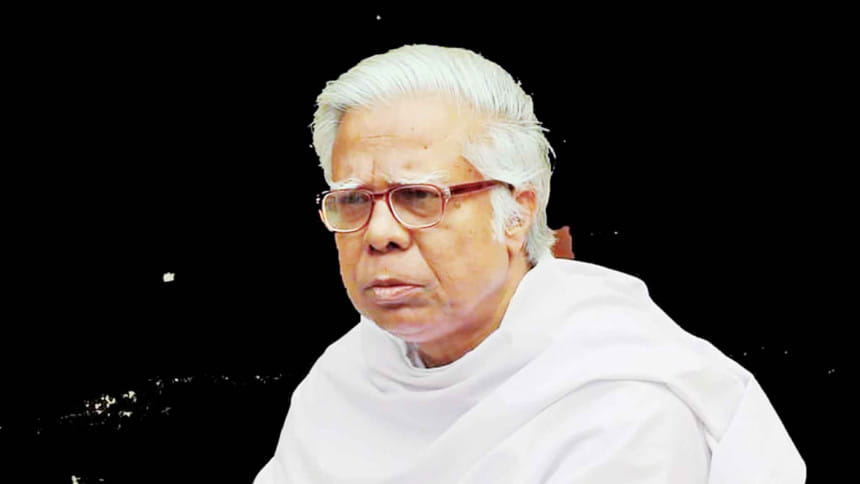Tribute by Mahfuz Anam: Syed Abul Maksud -- demise of an authentic voice of dissent

He was a journalist, turned writer, turned columnist, turned public intellectual -- meaning he devoted all his intellectual and physical abilities to promoting public causes. It was as if his world was that of social issues, and what he did from morning till the day's end was to lend his voice and his writings to articulate what he felt needed to be said to uphold people's rights. Always a highly conscious man, a thinking man, and emotionally involved in issues of public concern. Never hesitating to become a part of a protest, a roadside demonstration, a placard holding gathering of a few or taking part in an awareness campaign that he felt that people needed to be made aware of, like climate change. Thus, he was an ever present figure in all sorts of protest marches concerning political, social or economic challenges.
He was a stalwart of our movement against forced disappearance, abuse of power, child marriage, violence against women, etc. He was always present in movements demanding road safety, safe drinking water, against slum eviction, etc. He would give most generously his time to promote every social and volunteer group in which he could see a trace of humanity and patriotism.
But it was the bigger picture of shrinking intellectual space that most concerned him. He dreamt of a democratic and free Bangladesh and any reversal of it pained him to the core and he couldn't desist from protesting. He was also seriously concerned at the rising religious extremist trends in society. He considered both these tendencies to be fundamentally antithetical to the core values of our freedom struggle.
A humble man, he never showed a trace of ego and desire for special treatment. Always ready to oblige and listen to people from every ethnic, social or religious group. He would react very badly and almost feel personally hurt when political figures would insult one another in objectionable terms. He would insist that even in condemning someone there should be an elegance of expression. According to him, under no circumstances should one lower the bar of linguistic refinement. This he also insisted in personal behaviour. His interactions with people from all walks of life and from every strata of society would be marked by a sensitivity and attention to personal courtesy that would make every encounter refreshing and pleasant.
His interest was wide and varied, from literary to political, from memoirs to history, to tourism, to journals of visits, to snippets from the lives of eminent persons. He wrote just as easily on Maulana Bhashani as on Sir Philip Joseph Hartog, the first vice chancellor of Dhaka University. He wrote on Syed Walliullah, on Buddhadeb Basu, on Tagore and on the dilemmas of Muslim Bengali intellectuals.
In the last two decades, he excelled as a columnist. When in 2004, while working as a senior staff of the state-owned news agency BSS, he wrote a stinging essay after the murder of writer and university professor Humayun Azad terming it the "rise of naked Fascism", he was asked by the BSS authority to desist from writing columns anymore. That triggered his resignation and emergence as one of the most popular columnist in the country. His voice was one of dissent, one of a fresh perspective, one of thinking out of the box.
His very last column on the proposal by some in the ruling party about withdrawing the gallantry award given to the one of the most prominent of our sector commanders of our Liberation War, former president Ziaur Rahman and the founder of BNP, was a contrarian one. The argument he made in his column was most powerful. He warned the present holders of power not to set any example that future powers holders may use as an excuse for their own political vendetta.
It was remarkable that while we all stood aghast at the US's invasion of Iraq on false pretence, Syed Abul Maksud took it upon himself to protest in the Gandhian style of non-cooperation by abandoning western style clothing and wearing only two pieces of unstitched white cloths as an attire. This he vowed to carry on, as his personal protest, till every US soldier would leave Iraq. He did so till the very last day of his life.
This taking personal responsibility to articulate a social concern was what made Syed Abul Maksud so special. For every cause he felt a personal responsibility and if nobody would protest, he would take it upon himself to do what he felt needed to be done. Over the years, he became a personification of civic protest. For every just cause he would be a definite presence in the protest rallies.
That was Syed Abul Maksud, the voice that would articulate views that others would not dare to. More the protesting voices were stymied the more he became loud and poignant.
With his passing, we lose an authentic dissenting voice whose love for the people was based on a genuine love for them, on ethical values, on social concerns, and we lose a far sighted vision of the society that is increasingly becoming rare.

 For all latest news, follow The Daily Star's Google News channel.
For all latest news, follow The Daily Star's Google News channel. 



Comments